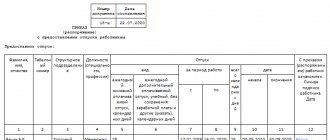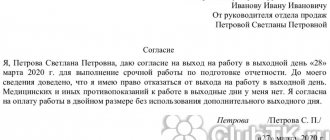Work on legal rest days
Work on weekends
In all countries of the world there are days when a person can rest, that is, he has legal rest time. Article 113 of the Labor Code of the Russian Federation stipulates that on these days the employee is prohibited from being involved in work.
However, sometimes a situation arises that requires mandatory, urgent action, regardless of the day off or holiday. The current unusual situation may pose a threat to the peace and well-being of the population.
In the modern world, disasters, natural disasters, and man-made accidents occurring at an enterprise are not uncommon. Here it is necessary to organize operational protective actions. To carry out urgent urgent activities in order to prevent accidents, destruction, and all kinds of property damage, labor activities are allowed on weekends.
The same rules apply to workers in the media, cinema, theater, and people employed in the creative field. Social and labor relations under such a labor regime are regulated by commissions that deal with labor issues, consider collective agreements and regulatory agreements.
Payment corresponds to the exclusivity of the moment:
- Workers with piecework basic pay are given double earnings.
- Workers with daily and hourly rates receive double payment in accordance with the basic rate.
- According to official salary - daily earnings for one working day are added on top of the salary.
The concept of production necessity in 2020 according to the Labor Code of the Russian Federation
Labor legislation does not contain a clear concept of production necessity, however, the Labor Code of the Russian Federation often directly affects this category. In particular, Art. 101, 125, 113, 99, 72.2 Labor Code of the Russian Federation. In addition, it is contained in Federal Law No. 417 of the city. In the given standards, production necessity is mentioned in connection with:
- the emergence of an urgent need to prevent a disaster;
- the need to eliminate the accident and/or eliminate its consequences in the workshop where production activities are carried out;
- minimizing the destructive consequences of natural disasters;
- preventing situations that could lead to accidents;
- prevention of financial and/or property losses;
- appointing an employee to replace an absent colleague.
In these cases, the management staff makes certain management decisions, the most common of which is calling subordinates back from vacation or promptly transferring them to other positions.
Who is prohibited from engaging in overtime work?
Labor legislation does not contain a single concept of production necessity and does not regulate it separately.
It is mentioned in the Labor Code of the Russian Federation (hereinafter referred to as the Labor Code of the Russian Federation) mostly indirectly in connection with:
- temporary transfer of an employee to another job;
- overtime work (OWS);
- the need to work on weekends and holidays;
- as well as when an employee is recalled from vacation, etc.
Production difficulties are solved by collective work. The Labor Code and numerous government documents stipulate certain nuances regarding the involvement of employees in urgent activities, indicating who can and cannot be mobilized for these matters. Those categories who are not allowed to participate in the work include:
- women during pregnancy;
- minors.
Not involved:
- working disabled people;
- women with young children;
- single parents with children under 5 years of age;
- employees who care for disabled children;
- for caring for sick relatives (confirmation by medical documents);
- guardians of young children.
It is important for a manager to know medical indications so as not to violate the legal rights of employees.
Calling from vacation: nuances and features
The company's management has the right to call an employee back from vacation, but on the condition that the subordinate is indispensable at his workplace or one of the cases described earlier has arisen. It should be emphasized that, according to the law, the recall of a subordinate from annual vacation can only be done by agreement of the parties. The employer will not be able to take such a step solely at his own personal request, and all demands made are considered illegal, including threats and pressure.
If such an agreement is reached, the employee retains the right to unused rest time, and he can choose a time convenient for himself independently.
Types of production necessity and situations causing it
Based on Art. 72.2 of the Labor Code of the Russian Federation, the employer has the right to transfer a subordinate to a position for a period of up to 1 calendar month, even if this is not stated in the subject’s employment agreement. At the same time, the employee’s consent is not mandatory. A written agreement is only necessary if the employed person is transferred to a position with lower qualifications than his current job requires. Thus, translation in case of production necessity is carried out in the following circumstances :
- emergency situations caused by natural or man-made accidents;
- fires and earthquakes;
- mass starvation;
- various epidemics.
In fact, it refers to any circumstances in which the inhabitants of a state are exposed to serious danger. Measures taken in these conditions are aimed at eliminating negative impacts on people's health and lives.
There are often situations when employers use the concept of production necessity in order to attract subordinates to additional work. However, this category can only be used if the following grounds exist:
- emergency incidents that are civil in nature or lead to the introduction of martial law;
- natural disasters;
- production downtime for any unforeseen reason;
- the need for an employee to replace his absent colleague due to an emergency;
- restoration of property that has been damaged and is owned by the business entity.
Production necessity is a forced measure. Manipulations with the reshuffling of personnel within the company without significant reasons for this are unlawful.
Working beyond the established time limit
The labor legislation of the Russian Federation established a 40-hour working week as the norm for workers of all forms and types of activities, labor agreements and other conditions. According to the Labor Code of the Russian Federation, processing in excess of the legal norm is allowed.
This means that an employee can work for additional pay more hours than is required according to the norm in a shift or in one working day, as well as in excess of the hours of the accounting period. Processing is allowed up to 2 hours per day, up to 120 hours per year.
Article 99 of the Labor Code of the Russian Federation outlines the conditions for such work:
- The decision on production necessity comes from the employer.
- Activities are carried out beyond the established time limits to complete the work started.
- To carry out the repair process, eliminate the causes, in order to avoid stopping the plant.
- In continuous production, the absence of a shift worker is grounds for overtime work.
Delay at the employee's workplace at his discretion is not overtime work and is not paid. Sometimes an employer has the right to involve an employee in overtime work without his consent.
This is acceptable if:
- there is a need to prevent threatening production circumstances (man-made disasters, accidents, destructive phenomena);
- violations were discovered in the supply of water or gas, heat and electricity, problems with transport and communications;
- an emergency occurred (fire, flood, etc.).
What types of PN exist?
The most famous option using this concept is to transfer an employee to another position. The employer has every right to do this, even if this clause is not in the employment agreement.
It is important to note that the employee’s written consent is not a mandatory document here. The paper is required only if a person is transferred to a position at a qualification level that is lower than his current status.
Transfer due to operational necessity is possible and carried out only under exceptional circumstances, or more precisely:
- Emergencies caused by natural disasters, man-made accidents;
- if the residents of the country are exposed to serious danger, with the subsequent protection of people’s lives and health;
- to increase the profitability of the company and to attract people to additional work.
It is important to note here that production necessity is a forced measure that can be used by the employer only under certain circumstances. Any fraud or shuffling within the framework of this term is unacceptable and may result in the employer being held liable.
Employee transfer
A striking example of production necessity is the temporary transfer of an employee, provided for in Parts 2 and 3 of Art. 72.2 Labor Code of the Russian Federation.
In exceptional cases that threaten the life of the population or its normal life (natural/man-made disasters, industrial accidents, industrial accidents, fires, floods, famine, earthquakes, epidemics or epizootics), in order to prevent them or eliminate the consequences, it is possible to transfer an employee without his consent for another job not stipulated by the employment contract with him, for a period of up to one month.
A similar right is granted to the employer in situations of downtime caused by the circumstances listed above. Only transfer to a less qualified job requires the written consent of the employee.
How is transfer to another position ensured?
As noted earlier, the concept of production necessity is the replacement of an absent employee in order to perform urgent production tasks. Although there is no such promise in labor legislation, it exists in practice.
The administration of the enterprise has the right to transfer an employee to another job without the latter’s consent to these actions. The transfer period is one month and no more.
The reasons for the transfer can be justified as follows:
- The occurrence of an unforeseen situation, for example, fire, fire or destruction of buildings or technical devices.
- Production downtime. Suspension of production for significant reasons.
- Preventing damage to the employer's property caused by unforeseen circumstances.
But, in spite of everything, in such cases it is required to issue an administrative document; the employee must be familiarized with it under his personal signature. If an employee replaces a temporarily absent person, then he remains for the entire period until his colleague returns to work.
How to process an employee transfer, see this story:
https://youtu.be/RZb4OzCMMqQ
Work on weekends and non-working holidays
According to the general rules established by Art. 113 of the Labor Code of the Russian Federation, work on such days is prohibited, except in exceptional cases when it is necessary:
- prevent a disaster/accident or eliminate its consequences;
- prevent accidents, destruction/damage to property;
- for work necessary during a state of emergency or martial law, as well as urgent work in emergency circumstances that threaten the life or normal functioning of the population;
- urgently carry out previously unforeseen work that affects the further normal operation of the organization.
In the first three cases, the involvement of an employee is allowed without his consent; in the latter, the employee’s consent must be in writing.
Transfer to another position for production reasons
Employers often use the concept of “production necessity” when an employee needs to replace one of his colleagues or for some other reason the employer needs to transfer the employee to another job. However, it is worth noting that when transferring an employee to another job, the term “production necessity” is absent in the Labor Code. There are no changes in this regard in 2020.
An employer can transfer an employee to another job without obtaining his consent. However, the period of time for which this can be done is very short - no more than one month. Also, the reasons that can justify this translation are very limited:
- industrial emergency: fire, flood, earthquake, etc.;
- production downtime (temporary suspension of production for various reasons);
- the need to prevent destruction or damage to property owned by the company or to replace a temporarily absent employee if it is caused by emergency circumstances.
In the latter case, that is, if in order to prevent destruction or damage to company property or in order to replace an employee who is temporarily absent, it is necessary to transfer the employee to a job of lower qualifications, then despite the fact that you have an urgent production need, the Labor Code of the Russian Federation requires obtain written confirmation of the employee’s consent to the transfer, and then issue an order for the temporary transfer of the employee.
In addition, there are options in which an employee can be transferred to another job for a longer period - up to 12 months, but also only with his written consent. If the employer makes this transfer in order to replace a temporarily absent employee, the transfer can be made for the entire period until this employee returns to work.
Calling an employee back from vacation due to production needs
A specific list of cases in which an employee can be called back from annual leave ahead of time, as well as the reasons why this can be done, is not defined by law. Any production necessity can be cited as such a reason, that is, the employer urgently requires the presence of an employee at the workplace at a certain time.
A certain list of situations in which, in case of production necessity, the employer has the right to call an employee back from vacation ahead of time, can be recorded in local regulations, for example, in labor regulations.
Employers need to remember: you cannot simply call an employee back from vacation and deprive him of his rest. Recall of an employee from vacation is possible only with his consent, no matter for what reason, including for production reasons (Labor Code of the Russian Federation).
You can submit an employee's recall from vacation in the following order:
- justify the reason for recall from vacation. To do this, the person who initiated the call of the employee from vacation, for example, a manager, can draw up a memo;
- the employee must agree to come to work. It is better if the consent is in writing;
- the employer issues an order to call him back from vacation - the order must be signed by the employee.
The unified form of such an order on the operational necessity of recall from vacation has not been approved, so the order should be drawn up in free form. Then you should record changes in the vacation schedule and note the fact that the employee was called back from vacation in his personal card.
Due to operational necessity (Labor Code, Article 125), certain categories of employees cannot be deprived of leave. Such personnel include workers who are not adults (under 18 years of age), pregnant women and workers who work in difficult, harmful or dangerous working conditions.
The concept of production necessity in the Labor Code of the Russian Federation
What is production necessity?
In labor law there is no single definition of production necessity.
The mention of it in legislative documents relates to certain circumstances and is stipulated in some articles:
- Article 101 of the Labor Code of the Russian Federation.
- Article 125 of the Labor Code of the Russian Federation.
- Article 113 of the Labor Code of the Russian Federation.
- Article 99 of the Labor Code of the Russian Federation.
- Article 72.2 part 2 and 3 of the Labor Code of the Russian Federation.
- Federal Law - N 417 dated December 7, 2011.
Here we mean the following situations:
- related to disaster prevention;
- liquidation of the accident and its consequences at the production site;
- to minimize the forces of destruction during a natural disaster;
- to prevent the occurrence of accidents for a number of reasons of any nature;
- prevent property losses;
- provide a replacement for the absent employee.
In everyday work environments, disruptions may occur for economic, technological, technical and organizational reasons. The production need that arises is resolved by the team by order of the enterprise administration. Due to production needs, temporary transfer to another position is permitted.
Order due to production necessity: sample
LLC "Lyudmila"
Order
10.03.2017 №1
Moscow
About recalling an employee from vacation
Due to the need to urgently depart on a business trip to participate in a conference in Irkutsk (business trip duration - 10 days; from March 12 to March 22, 2020)
I ORDER:
- Recall N.V. Oleinik, head of the marketing department, from annual paid leave. from March 12, 2020;
- Provide Oleinik N.V. the remainder of the annual leave (10 calendar days) at a time convenient for the employee during the current calendar year;
- Chief Accountant R.V. Petrova recalculate vacation pay and offset the overpayment against wages for March 2017;
- Head of the HR Department Volnina D.V. make the necessary changes to the vacation schedule No. 1 dated December 15, 2020 and the time sheet for March 2020;
- Control over the implementation of this order is assigned to the head of the personnel department, D.V. Volnina.
Reason: invitation to the XI International Conference “IT in Retail”, notice of withdrawal from annual paid leave with written consent from Oleynik N.V. from 03/07/2017
Comments on Art. 74 Labor Code of the Russian Federation
1. The current labor legislation, in addition to transfers to another permanent job, provides for cases of temporary transfer. The commented article regulates the issues of temporary transfer to another job. The employer has the right to temporarily transfer an employee to a job not stipulated by the employment contract in case of production necessity. A transfer due to production necessity will be legal if production necessity actually exists. This standard provides an exclusive list of cases of production necessity, which include: preventing a catastrophe, industrial accident or eliminating the consequences of a catastrophe, accident and natural disaster; preventing accidents, downtime, destruction or damage to property, as well as replacing an absent employee.
Unlike previous legislation, the Labor Code of the Russian Federation allows such a transfer only in the organization with which the employee has an employment relationship.
Cases of production necessity include downtime, which is understood as a temporary suspension of work for reasons of an economic, technological, technical or organizational nature. Since this article does not stipulate what job an employee can be transferred to due to operational necessity, such a transfer is possible without taking into account the qualifications, specialty or position of the employee (for example, when transferring an employee to eliminate a natural disaster). However, the employee cannot be transferred to a job that is contraindicated for him due to health reasons.
The transfer of an employee to replace an absent employee is permitted in cases where the replaced employee is temporarily absent from work for any reason (is on vacation, sick, etc.). In practice, temporary substitution is carried out in two ways: the replacement employee is released from performing his main duties and is temporarily transferred to another job due to production needs; the replacement employee performs his or her duties and the duties of the replaced employee. Payment for the labor of an employee transferred due to production needs is made from the first day of transfer for the work performed, but not lower than the average earnings of the employee for his previous job. In the event that an employee temporarily performs the duties of an absent employee without being released from his main job, he is made appropriate additional payments, the amount of which is established by agreement of the parties (see Article 151 of the Labor Code of the Russian Federation and the commentary thereto).
2. The duration of the transfer due to production needs should not exceed 1 month. The law does not limit how many times a year an employee can be transferred for operational reasons. Therefore, such a translation is possible more than once.
In case of replacing an absent employee, such a transfer is possible for a period of up to 1 month during the calendar year (from January 1 to December 31). With the consent of the employee, temporary substitution may continue for a longer period.
3. Temporary substitution should be distinguished from the transfer (appointment) of an employee to a vacant position. Such a transfer (assignment) is permitted only with the consent of the employee. If an employee who has transferred to a position must be approved by a higher authority, then before approval he is appointed acting. If an employee is not approved for a position, he is given a job in his specialty and qualifications with a payment not lower than what he performed before being transferred to a vacant position.
4. Temporary transfer for operational reasons does not require the employee’s consent. It is mandatory for the employee if the transfer occurs without violating the requirements established by the Labor Code of the Russian Federation.
A temporary transfer is formalized by an order (instruction) of the head of the organization (enterprise), which must indicate the reasons and duration of the temporary transfer.
5. Part 3 of the commented article provides that with written consent, an employee may be transferred to a job requiring lower qualifications. Therefore, transfer due to production needs must be made taking into account the specialty and qualifications. But this rule contradicts the nature of translation due to production necessity: the exclusivity of its cases and temporary nature. The essence of this transfer is precisely that it does not require the employee’s consent and is limited in time. This article gives the employer the unconditional right to transfer employees without their consent to work not stipulated by the employment contract in case of production necessity.
When applying the commented article, which allows for the temporary transfer of an employee at the initiative of the employer to a job not stipulated by an employment contract in the same organization in case of production necessity, it should be borne in mind that in accordance with paragraph 1 of Art. 1 of ILO Convention No. 29 “On Forced or Compulsory Labor” (1930) (ratified by the Decree of the Presidium of the Supreme Soviet of the USSR dated) the Russian Federation has committed to abolish the use of forced or compulsory labor in all its forms, i.e. any work or service required from any person under threat of any penalty and for which this person has not voluntarily offered his services (clause 1 of Article 2 of the Convention). At the same time, by virtue of sub. "d" clause 2 art. 2 of the said Convention, as well as Part 4 of Art. 4 of the Labor Code of the Russian Federation, any work or service required in emergency circumstances is not considered forced labor, i.e. in cases of declaration of a state of emergency or martial law, disaster or threat of disaster, such as: fires, floods, famine, earthquakes, severe epidemics or epizootics, invasion of harmful animals, insects or plant parasites, as well as in other cases that threaten or may endanger the life or normal living conditions of all or part of the population.
Taking into account these provisions, the employer has the right to transfer the employee to work not stipulated by the employment contract in order to prevent: a catastrophe, industrial accident or eliminate the consequences of a catastrophe, accident or natural disaster; accidents (part 1 of the commented article).
At the same time, based on the specified provisions of the ILO Convention on Forced or Compulsory Labor, the provision provided for in Part 1 of the commented article is the temporary transfer of an employee without his consent to work not stipulated by the employment contract to prevent downtime (temporary suspension of work for reasons of an economic, technological, technical or organizational nature) , destruction or damage to property, as well as to replace an absent employee, may be considered justified provided that this was caused by emergency circumstances (subparagraph “d”, paragraph 4 of the Convention, part 4 of article 4 of the Labor Code of the Russian Federation), or when failure to accept the specified measures could lead to a catastrophe, industrial accident, natural disaster, accident and similar consequences (see paragraph 17 of the Resolution of the Plenum of the Armed Forces of the Russian Federation dated No. 2).
When resolving cases related to transfer to another job, it is necessary to keep in mind that refusal to perform work during a transfer made in compliance with the law is recognized as a violation of labor discipline, and absence from work is considered absenteeism.
How to transfer leave due to production needs?
In order for an employee’s vacation to be postponed to another period, or to be changed, or even to be withdrawn from the EOO, in addition to the desire and consent of the parties, the following formal actions must be completed.
Download
Sample order to postpone vacation (25.5 KiB, 381 hits)
An order to postpone vacation due to production needs. Example (10.5 KiB, 492 hits)
Notifying the employee about the postponement of vacation. Blank (26.0 KiB, 407 hits)
Written consent of the employee. Writing sample (10.5 KiB, 356 hits)
The company management or the human resources department prepares an order to change the vacation schedule, which is approved annually. This order is signed by the manager, entered into the appropriate register or book of orders, and brought to the attention of each employee personally against signature for familiarization.
Company order
If an employee is recalled from leave, he or she must be given formal notice in writing. Those. A simple phone call is not enough for this. A written notice must be prepared and given to the employee being recalled from the EOO.
Written Notice
If a production need arises, then an employee’s application to transfer his SOO is, as a rule, not required. Everything is decided by a unilateral order from the organization’s management and the employee’s consent is not necessary.
However, there are cases when an employee may ask to change the vacation period or add the unused part (calendar days) to another vacation period for the next year. The application is written to the director of the company or organization.
Download
Example of an application to transfer a vacation (25.0 KiB, 244 hits)
Employee statement
In addition to these three important points accompanying the formal side of the transfer of SOO for production reasons, there are two more issues that you need to know about.
The first point is the deadline or date for rescheduling the vacation. Nowhere is there any indication of what the appointment date should be. Usually the employee chooses the best option for him. Again, everything is decided when discussing such issues with the employer.
The second point is related to the payment of vacation pay. For example, an employee, going on vacation, received a full cash benefit for the entire period of the Unified Society. If the employer called the employee back from vacation, i.e. he actually didn’t finish it, then should he return the amount that is associated with the unused days of the EOO? The law in this regard clearly states that vacation money is not a refundable cash benefit and if the vacation (or part thereof) is unused, it is not returned by the employee.
No one is insured against force majeure, including the head of an enterprise. And it often happens that a vacation planned several months ago needs to be rescheduled.
Is this possible by law, how to arrange everything correctly and what nuances should you know and remember?
Transferring leave due to production needs is not a rare phenomenon in enterprises and organizations.
Although vacation schedules are drawn up a year in advance - to be precise, no later than two weeks before the start of the new calendar year, that is, before January 1 - after agreement with management, the trade union and the team, emergency circumstances often arise when they changes need to be made.
In this case, the initiator can be both the employer and his subordinate.
Features of recalling an employee from vacation
An employer may recall an employee from vacation in cases where the subordinate is irreplaceable in one of the previously mentioned emergency cases.
Based on Art. 125 of the Labor Code of the Russian Federation, we can conclude that the recall of a subordinate from annual leave can only be carried out by agreement of the parties. That is, the employee must voluntarily agree to return to work earlier than expected. The employer does not have the right to implement this procedure solely at his own discretion or to persuade a subordinate to make a decision through threats or pressure.
That part of the vacation that the subject did not have time to use will be transferred to a period of time during the current year that the employee determines independently. It can also be carried forward to the next reporting period.
Call to work from vacation due to production needs
According to the Labor Code of the Russian Federation, a production need may arise during an employee’s next paid vacation, for example, when the organization:
- carry out an unscheduled inventory, during which the financially responsible person must be present at work;
- undergoes an on-site inspection by the labor and tax inspectorates;
- Some problems have arisen that affect the work of the entire company, and so on.
In accordance with Article 125 of the Labor Code of the Russian Federation, the employer has the right to interrupt vacation only with the consent of the employee. The recall is formalized by an order, which is drawn up in any form, where the employer indicates: “ due to production needs, I order the economist Kondratiev to be recalled from vacation...
».
Order to recall from leave due to production needs
The employer can call from annual leave an unlimited number of times if the employee is not subject to the ban on recall (in accordance with part two of Article 125 of the Labor Code of the Russian Federation) and the employee himself agrees to interrupt the vacation. All unused vacation days must be provided in the current year or, as a last resort, timed to coincide with the next vacation. Also, when recalling, you need to take into account that the employee can use the indivisible part of the vacation, which is 14 days
.
In case of production necessity, the employer may change the time of the next vacation specified in the vacation schedule. When transferring vacation, the employee must use all allotted days no later than the next 12 months immediately after the end of the working year for which the vacation was provided. The exception is certain categories of workers and civil servants, for whom this rule applies with restrictions. This procedure is provided for in Article 124 of the Labor Code.
Read more: Is it possible to use a foreign passport instead of a regular one?
An expert from Sistema Personnel will tell you whether it is possible to bring an employee to disciplinary action for refusing to take annual leave
Who is covered by the ban on recall from leave for business reasons?
Even production necessity and written consent are not considered sufficient grounds for recall from vacation.
- employees under 18 years of age;
- pregnant women;
- employees who are engaged in work with harmful and dangerous working conditions.
The relevant rules are established in Part 3 of Art. 125 of the Labor Code of the Russian Federation. It is also unacceptable to recall from vacation those who have used all parts of a vacation of shorter duration and are in an indivisible part of 14 calendar days.
Article 99. Overtime work
Overtime work is work performed by an employee at the initiative of the employer outside the working hours established for the employee: daily work (shift), and in the case of cumulative accounting of working hours - in excess of the normal number of working hours for the accounting period.
An employer's involvement of an employee in overtime work is permitted with his written consent in the following cases:
1) if necessary, perform (finish) work that has begun, which, due to an unforeseen delay due to technical production conditions, could not be performed (finished) during the working hours established for the employee, if failure to perform (non-complete) this work may lead to damage or destruction of property the employer (including the property of third parties located at the employer, if the employer is responsible for the safety of this property), state or municipal property, or create a threat to the life and health of people;
2) when carrying out temporary work on the repair and restoration of mechanisms or structures in cases where their malfunction may cause the cessation of work for a significant number of workers;
3) to continue work if the replacement employee fails to appear, if the work does not allow a break. In these cases, the employer is obliged to immediately take measures to replace the shift worker with another employee.
An employer’s involvement of an employee in overtime work without his consent is permitted in the following cases:
1) when carrying out work necessary to prevent a catastrophe, industrial accident or eliminate the consequences of a catastrophe, industrial accident or natural disaster;
2) when carrying out socially necessary work to eliminate unforeseen circumstances that disrupt the normal functioning of centralized hot water supply, cold water supply and (or) sewerage systems, gas supply systems, heat supply, lighting, transport, communications;
3) when performing work the need for which is due to the introduction of a state of emergency or martial law, as well as urgent work in emergency circumstances, that is, in the event of a disaster or threat of disaster (fires, floods, famine, earthquakes, epidemics or epizootics) and in other cases, threatening the life or normal living conditions of the entire population or part of it.
In other cases, involvement in overtime work is permitted with the written consent of the employee and taking into account the opinion of the elected body of the primary trade union organization.
Pregnant women, workers under the age of eighteen, and other categories of workers are not allowed to work overtime in accordance with this Code and other federal laws. Involvement of disabled people and women with children under three years of age in overtime work is allowed only with their written consent and provided that this is not prohibited for them due to health reasons in accordance with a medical report issued in the manner established by federal laws and other regulations legal acts of the Russian Federation. At the same time, disabled people and women with children under three years of age must be informed of their right to refuse overtime work upon signature.
The duration of overtime work should not exceed 4 hours for each employee for two consecutive days and 120 hours per year.
The employer is required to ensure that each employee's overtime hours are accurately recorded.
How is the transfer of leave due to production needs processed?
Drawing up an order
The order is drawn up so that appropriate changes are officially made to the vacation schedule.
The order is written on behalf of the director. It must clearly indicate the reasons why there is a need to postpone the vacation, and instructions must be given to the personnel department employees to make changes to the organization’s vacation schedule and other related documentation. The period for which vacation is postponed may not be indicated.
The order is signed by the director of the organization and the head of the legal department of the organization.
The employee must be familiar with it (which is also indicated in the order and certified by the employee’s signature) and other persons directly related to the change in schedule - for example, personnel department employees.
Sample order
Notification
The Labor Code of Russia does not clearly indicate the requirements for the execution of any of the documents related to the transfer or extension of leave.
All papers are drawn up in any form.
You just need to adhere to the standard details of the application and be sure to certify everything with signatures.
Employee notification
Is an employee application required?
An application from the employee is required if the transfer of leave is to be officially carried out according to all the rules.
It is drawn up in any form: in the “header” the position of the director, his last name and initials, the position, last name and initials of the employee are indicated, the application itself states the date to which the vacation will be transferred, and the employee’s consent to such a transfer.
At the bottom is the date the application was written and the employee’s signature.
Employee statement
A sample document can be downloaded here:
Sample application for rescheduling vacation
How is the transfer date determined?
The Labor Code of the Russian Federation does not establish any clear requirements for determining new terms and dates.
But at the same time, it is impossible to transfer vacation for a period of more than one year - the employee must use all the days allotted to him within 12 months from the date of transfer or termination of vacation.
The employee has the right to choose the time of his new vacation.
As for vacation pay, there is a small nuance: payments are calculated based on the employee’s average earnings, but are not considered wages.
Thus, if an employee received vacation money and went on vacation, but “didn’t finish” it because he was called to work by his superiors, he does not return the vacation money - according to the law, the employer does not have the right to withdraw it.
For hours and days worked during vacation, the employee’s salary is calculated as usual, regardless of whether he received vacation money or not. The recalculation will be carried out during the accrual of vacation pay next year, if the employee does not agree to voluntarily return them to the cash desk.
It is also possible to charge the amount towards the next advance or salary, depending on its size.
Is it possible to quit while on vacation? Read our article.
You can find out more about employer-initiated leave.
What to do if there is a holiday while on vacation? See.
The procedure for processing the transfer of an employee if there is a production need
Based on the fact that production necessity is a serious basis for making important personnel decisions and, in most cases, does not require the consent of employees, the following documents must be drawn up at the enterprise :
- written notice. Drawed up by the employer in free form. This document explains the reasons why subordinates are required to perform certain overtime tasks. In addition, the period of such a work schedule is prescribed, as well as the name of the subordinate (or group of subordinates) who must work overtime.
- Order on production necessity - contains information in accordance with which an employee is transferred to some other position for a certain period. The document must indicate the full name of the subordinate and the employer, the frequency, as well as the full name of the person responsible for the execution of the document. The paper is signed by the manager and employee.
If a transfer to another position involves a reduction in qualifications, the employee must (even if he does not fall into the appropriate category) give written consent to this procedure.
For example, a subject has the right to put his signature and the word “Agree” on a notice of the need for overtime work. In circumstances where a person is transferred to a more qualified job, the manager will have to pay for such work at new rates.
If an employee does not have a valid reason to refuse overtime work due to business necessity, he cannot do so. So, if a person does not work overtime, this will be counted as absenteeism.
How production needs are paid
Production necessity In the daily activities of an organization, there often arises an urgent need to involve an employee in work outside of his working hours or to transfer him to another job.
Let's consider what “production necessity” is and in what cases a reference to it will be legal. Table of contents: Production necessity What the law says Transfer of an employee Work on weekends and non-working holidays Review of an employee from vacation Consultant Plus: Forums # 1 05.28.: 26:22 Production necessity # 2 05.28. :41:48Re: Production necessity #3 05.28.:58:25Re: Production necessityAll about production necessityWhat is recognized as a production necessityRestrictions for the employerMedical indicationsTermsQualificationPlace
We recommend reading: September holiday at sea abroad without a visa







